Unit3 Teenage problem B卷提升篇(含解析)牛津译林版九年级上册
文档属性
| 名称 | Unit3 Teenage problem B卷提升篇(含解析)牛津译林版九年级上册 | 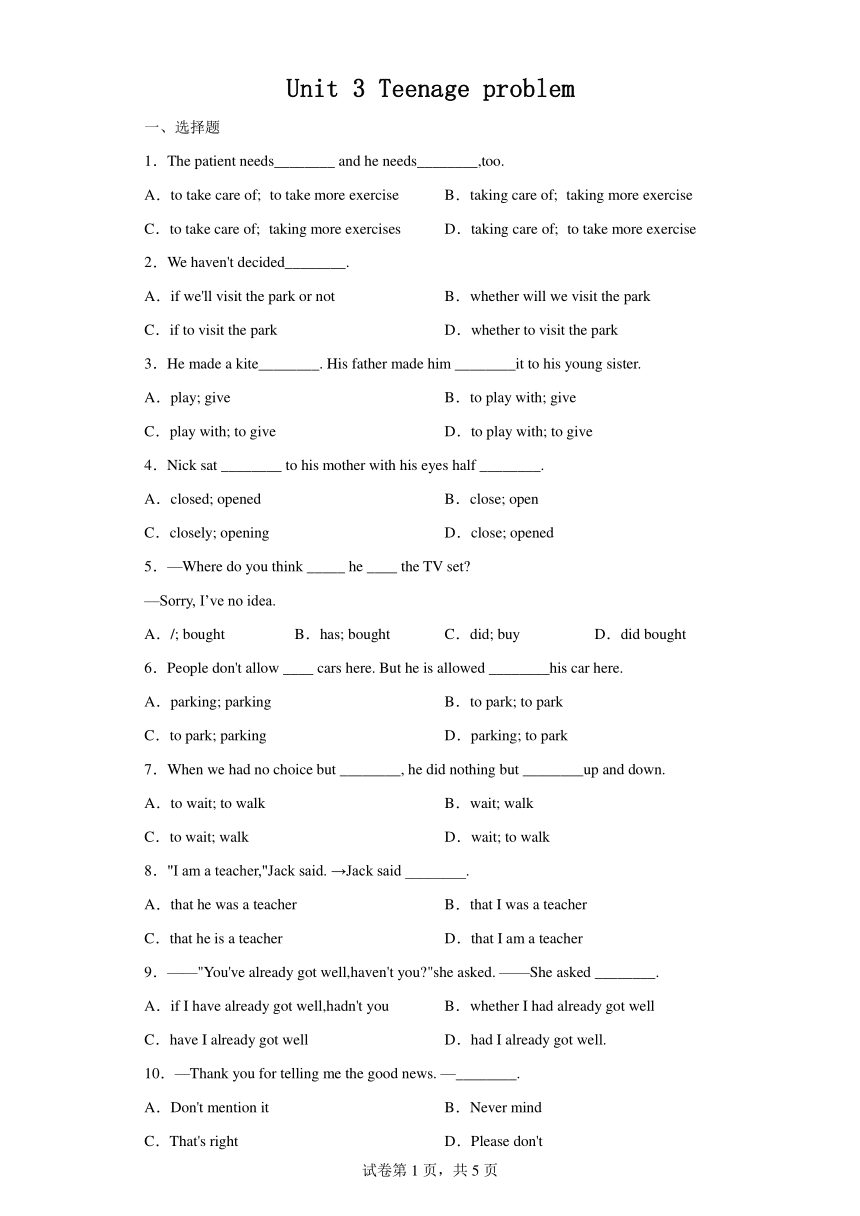 | |
| 格式 | docx | ||
| 文件大小 | 31.6KB | ||
| 资源类型 | 教案 | ||
| 版本资源 | 牛津译林版 | ||
| 科目 | 英语 | ||
| 更新时间 | 2023-11-26 22:33:08 | ||
图片预览

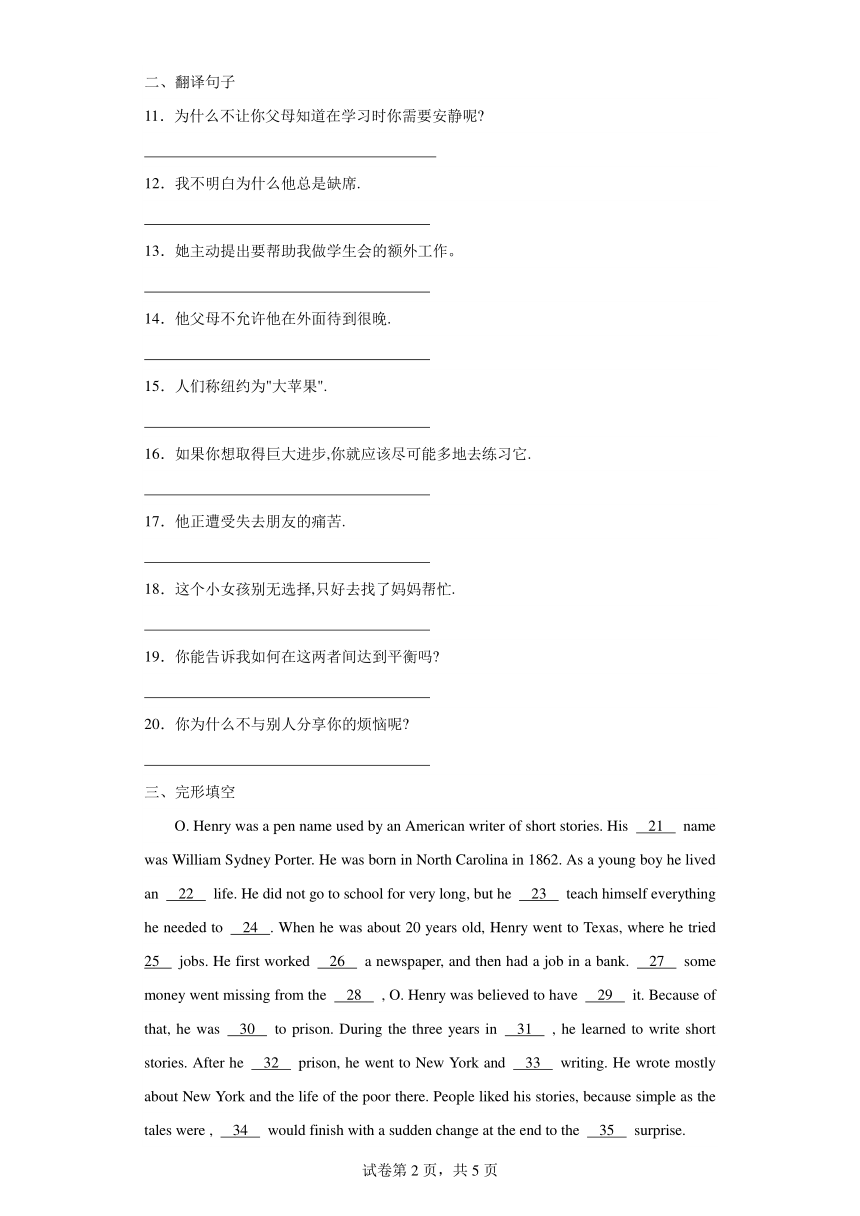
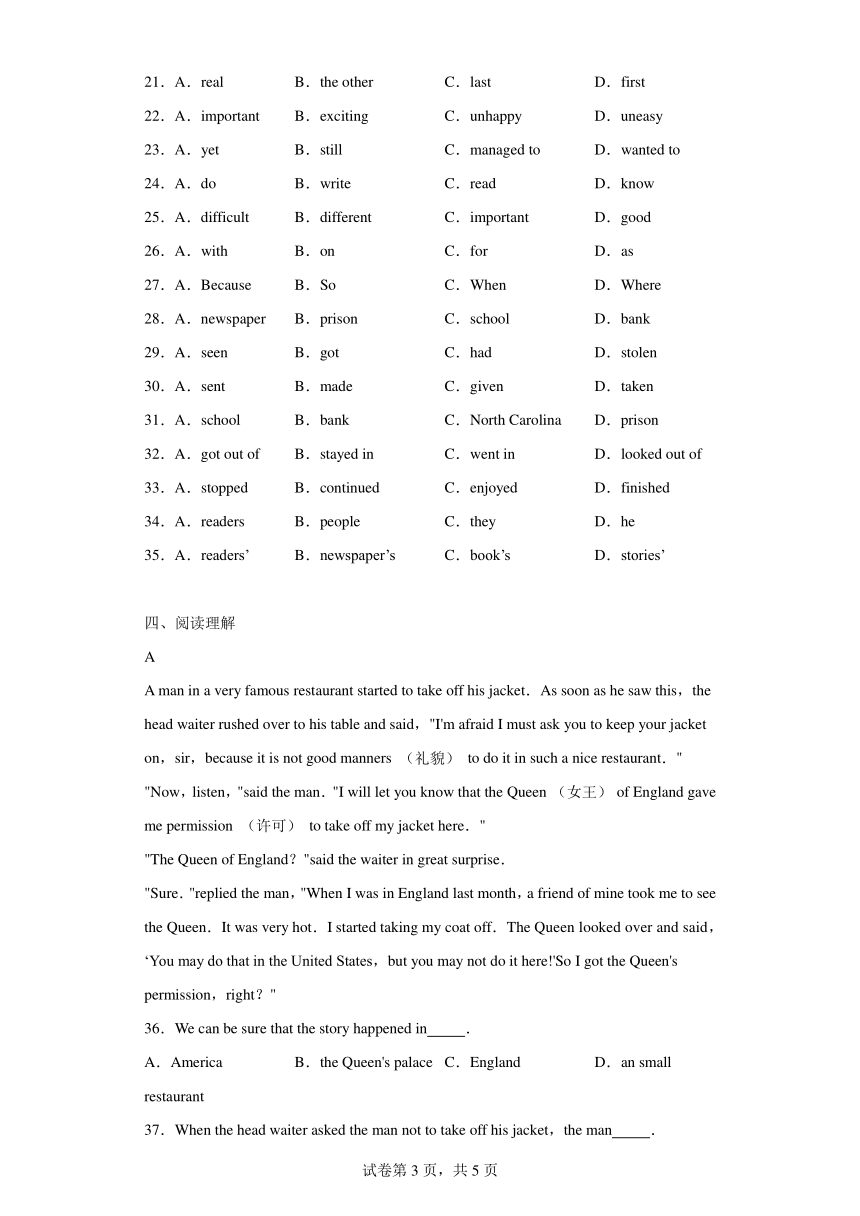
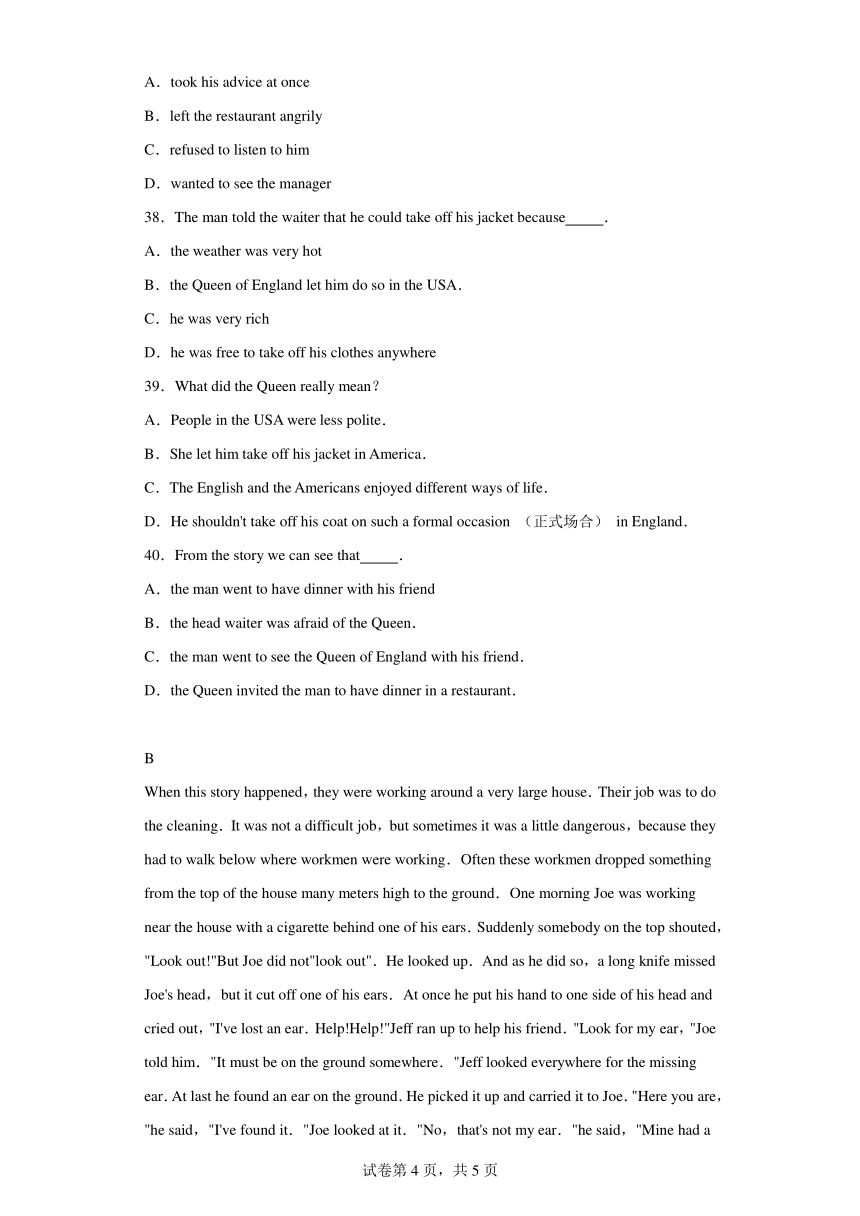
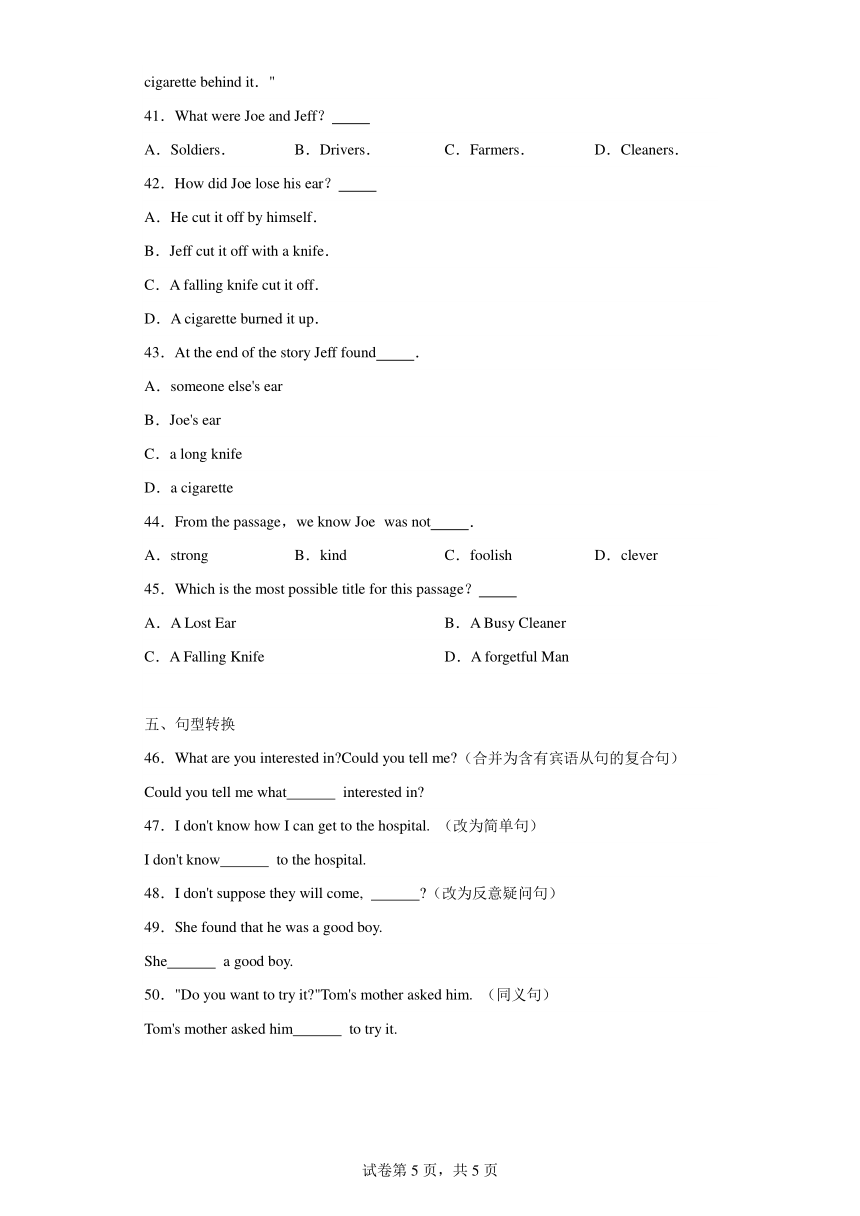
文档简介
Unit 3 Teenage problem
一、选择题
1.The patient needs________ and he needs________,too.
A.to take care of; to take more exercise B.taking care of; taking more exercise
C.to take care of; taking more exercises D.taking care of; to take more exercise
2.We haven't decided________.
A.if we'll visit the park or not B.whether will we visit the park
C.if to visit the park D.whether to visit the park
3.He made a kite________. His father made him ________it to his young sister.
A.play; give B.to play with; give
C.play with; to give D.to play with; to give
4.Nick sat ________ to his mother with his eyes half ________.
A.closed; opened B.close; open
C.closely; opening D.close; opened
5.—Where do you think _____ he ____ the TV set
—Sorry, I’ve no idea.
A./; bought B.has; bought C.did; buy D.did bought
6.People don't allow ____ cars here. But he is allowed ________his car here.
A.parking; parking B.to park; to park
C.to park; parking D.parking; to park
7.When we had no choice but ________, he did nothing but ________up and down.
A.to wait; to walk B.wait; walk
C.to wait; walk D.wait; to walk
8."I am a teacher,"Jack said. →Jack said ________.
A.that he was a teacher B.that I was a teacher
C.that he is a teacher D.that I am a teacher
9.——"You've already got well,haven't you "she asked. ——She asked ________.
A.if I have already got well,hadn't you B.whether I had already got well
C.have I already got well D.had I already got well.
10.—Thank you for telling me the good news. —________.
A.Don't mention it B.Never mind
C.That's right D.Please don't
二、翻译句子
11.为什么不让你父母知道在学习时你需要安静呢
12.我不明白为什么他总是缺席.
13.她主动提出要帮助我做学生会的额外工作。
14.他父母不允许他在外面待到很晚.
15.人们称纽约为"大苹果".
16.如果你想取得巨大进步,你就应该尽可能多地去练习它.
17.他正遭受失去朋友的痛苦.
18.这个小女孩别无选择,只好去找了妈妈帮忙.
19.你能告诉我如何在这两者间达到平衡吗
20.你为什么不与别人分享你的烦恼呢
三、完形填空
O. Henry was a pen name used by an American writer of short stories. His 21 name was William Sydney Porter. He was born in North Carolina in 1862. As a young boy he lived an 22 life. He did not go to school for very long, but he 23 teach himself everything he needed to 24 . When he was about 20 years old, Henry went to Texas, where he tried 25 jobs. He first worked 26 a newspaper, and then had a job in a bank. 27 some money went missing from the 28 , O. Henry was believed to have 29 it. Because of that, he was 30 to prison. During the three years in 31 , he learned to write short stories. After he 32 prison, he went to New York and 33 writing. He wrote mostly about New York and the life of the poor there. People liked his stories, because simple as the tales were , 34 would finish with a sudden change at the end to the 35 surprise.
21.A.real B.the other C.last D.first
22.A.important B.exciting C.unhappy D.uneasy
23.A.yet B.still C.managed to D.wanted to
24.A.do B.write C.read D.know
25.A.difficult B.different C.important D.good
26.A.with B.on C.for D.as
27.A.Because B.So C.When D.Where
28.A.newspaper B.prison C.school D.bank
29.A.seen B.got C.had D.stolen
30.A.sent B.made C.given D.taken
31.A.school B.bank C.North Carolina D.prison
32.A.got out of B.stayed in C.went in D.looked out of
33.A.stopped B.continued C.enjoyed D.finished
34.A.readers B.people C.they D.he
35.A.readers’ B.newspaper’s C.book’s D.stories’
四、阅读理解
A
A man in a very famous restaurant started to take off his jacket.As soon as he saw this,the head waiter rushed over to his table and said,"I'm afraid I must ask you to keep your jacket on,sir,because it is not good manners (礼貌) to do it in such a nice restaurant."
"Now,listen,"said the man."I will let you know that the Queen (女王) of England gave me permission (许可) to take off my jacket here."
"The Queen of England?"said the waiter in great surprise.
"Sure."replied the man,"When I was in England last month,a friend of mine took me to see the Queen.It was very hot.I started taking my coat off.The Queen looked over and said,‘You may do that in the United States,but you may not do it here!'So I got the Queen's permission,right?"
36.We can be sure that the story happened in .
A.America B.the Queen's palace C.England D.an small restaurant
37.When the head waiter asked the man not to take off his jacket,the man .
A.took his advice at once
B.left the restaurant angrily
C.refused to listen to him
D.wanted to see the manager
38.The man told the waiter that he could take off his jacket because .
A.the weather was very hot
B.the Queen of England let him do so in the USA.
C.he was very rich
D.he was free to take off his clothes anywhere
39.What did the Queen really mean?
A.People in the USA were less polite.
B.She let him take off his jacket in America.
C.The English and the Americans enjoyed different ways of life.
D.He shouldn't take off his coat on such a formal occasion (正式场合) in England.
40.From the story we can see that .
A.the man went to have dinner with his friend
B.the head waiter was afraid of the Queen.
C.the man went to see the Queen of England with his friend.
D.the Queen invited the man to have dinner in a restaurant.
B
When this story happened,they were working around a very large house.Their job was to do the cleaning.It was not a difficult job,but sometimes it was a little dangerous,because they had to walk below where workmen were working.Often these workmen dropped something from the top of the house many meters high to the ground.One morning Joe was working near the house with a cigarette behind one of his ears.Suddenly somebody on the top shouted,"Look out!"But Joe did not"look out".He looked up.And as he did so,a long knife missed Joe's head,but it cut off one of his ears.At once he put his hand to one side of his head and cried out,"I've lost an ear.Help!Help!"Jeff ran up to help his friend."Look for my ear,"Joe told him."It must be on the ground somewhere."Jeff looked everywhere for the missing ear.At last he found an ear on the ground.He picked it up and carried it to Joe."Here you are,"he said,"I've found it."Joe looked at it."No,that's not my ear."he said,"Mine had a cigarette behind it."
41.What were Joe and Jeff?
A.Soldiers. B.Drivers. C.Farmers. D.Cleaners.
42.How did Joe lose his ear?
A.He cut it off by himself.
B.Jeff cut it off with a knife.
C.A falling knife cut it off.
D.A cigarette burned it up.
43.At the end of the story Jeff found .
A.someone else's ear
B.Joe's ear
C.a long knife
D.a cigarette
44.From the passage,we know Joe was not .
A.strong B.kind C.foolish D.clever
45.Which is the most possible title for this passage?
A.A Lost Ear B.A Busy Cleaner
C.A Falling Knife D.A forgetful Man
五、句型转换
46.What are you interested in Could you tell me (合并为含有宾语从句的复合句)
Could you tell me what interested in
47.I don't know how I can get to the hospital. (改为简单句)
I don't know to the hospital.
48.I don't suppose they will come, (改为反意疑问句)
49.She found that he was a good boy.
She a good boy.
50."Do you want to try it "Tom's mother asked him. (同义句)
Tom's mother asked him to try it.
试卷第1页,共3页
试卷第1页,共3页
参考答案:
1.D
【详解】句意:病人需要照顾,他也需要多做锻炼。
考查非谓语动词。need doing意为“被需要做某事 ”,表被动意义;need to do sth意为“需要做某事”,表主动意义;根据语境可知,空格1指“需要被照顾”,后接动名词,空格2指“需要多做锻炼”,接不定式。故选D。
2.D
【详解】句意:我们还没有决定是否去参观公园。
考查宾语从句。根据句子结构,此句是一个宾语从句,从句用陈述语序,排除B选项。whether与or not一起连用,排除A选项。if后不可接不定式,whether后可接不定式,故选D。
3.B
【详解】句意:他制作了一个风筝可以玩儿,他父亲让他把风筝给他妹妹。
考查非谓语动词。He made a kite ... His father made him...it to his young sister.可知前半部分句子考查make sth. to do sth.。make意为“制作”,后接动词不定式作宾语补足语;后半部分考查make sb. do sth.,make意为“让”,后接动词原形作宾语补足语。故选B。
4.B
【详解】句意:尼克的眼睛半睁着,紧挨着他的母亲坐着。
考查形容词、副词辨析。close和open都可以用作形容词和动词;closed形容词或动词的过去式/过去分词;close还可以用作副词“紧密地”,表示距离;closely紧密地,表示感情上的亲近。结合语境sat“坐”,动词,可知,表示坐得近,第一空close用作副词做状语,排除A/C;第二空,opening作形容词是“开始的、首次的”;opened通常是过去式或过去分词;open形容词“开着的”,表示状态。结合语境“眼睛半睁着”,用作形容词作宾语补足语,表示状态。故选B。
5.C
【详解】句意:——你觉得他在哪里买的电视机呢?——对不起,我不知道。
考查特殊疑问句和一般过去时。这里可以do you think当作插入语,在理解句子时,就当do you think不存在就可以了;所以句子就变成了where _____he _____the TV set 根据句意可知,事情发生在过去,所以借助于助动词did,后跟动词原形,故选C。
6.D
【详解】句意:这里不允许停车。但他被允许把车停在这里。
考查非谓语。英语表达“允许做某事”是allow doing sth,而表达“被允许做某事”是be allowed to do sth,所以第一空应该用doing形式作宾语,第二空应用to do形式作主语补足语,故选D。
7.C
【详解】句意:当我们别无选择只能等待时,他什么也没做,只是走来走去。
考查非谓语动词。在含介词but的句型中,but前有do,则but后的不定式不能带to;相反,but前若找不到do,则but后的不定式必定带to。根据“When we had no choice but …, he did nothing but … up and down.”前半部分的but前没有do,but后用to do sth.,排除B/D;后半部分的but前有do,but后用do sth.。故选C。
8.A
【详解】句意:“我是一名教师,”杰克说。→ 杰克说他是个老师。
考查宾语从句。将陈述句改为宾语从句,要用连接词that;根据Jack said可知主句为过去时,则宾语从句要采用相应的时态,所以排除C、D选项。间接引语改直接引语时主语I要变成相应的第三人称,Jack是男人,所以人称用he,排除B,故选A。
9.B
【详解】句意:——她问:“你已经好了,是吗?”——她询问我是否已经好了。
考查宾语从句。直接引语变间接引语时,宾语从句的主句是一般过去时态,从句用过去完成时态。排除A和C。宾语从句中从句用陈述语序。故选B。
10.A
【详解】句意:——谢谢你告诉我这个好消息。——不客气。
考查常用日常交际用语。Don't mention it“不客气”;Never mind“没有关系”;That's right“那是对的”;Please don't“请不要这样”。根据题干“Thank you for telling me the good news”谢谢你告诉我这个好消息。可知应说不客气。故选A。
11.Why not let your parents know that you need silence when (you're) studying?
【详解】why not意为“为什么不”,后接动词原形;let sb. do sth. 后接动词原形作宾语补足语;when可作连词,意为“当……时候”,后接时间状语从句,从句的主语和主句的主语一致,且从句中含有be动词的时候,从句的主语和be动词可以省略。故填Why not let your parents know that you need silence when (you’re) studying?
12.I don't understand why he is always absent.
【详解】明白:understand;总是:always;缺席:be absent。根据中文可知句子为一般现在时,谓语动词为“不明白”,结合主语I可知要借助助动词don't变否定;又“为什么他总是缺席”是动词understand的宾语,是一个句子,所以要此处要用连接词why引导宾语从句,从句要注意用陈述语序,故填I don't understand why he is always absent.
13.She offered to help me to do extra work for the Students' Union.
【详解】主动提出:offer to do,用不定式作宾语;帮助我做:help me to do;学生会的额外工作:extra work for the Students’ Union,根据汉语意思可知,此处表达的是过去的事情,所以动词应用过去式,故填She offered to help me to do extra work for the Students' Union.
14.His parents don't allow him to stay out late.
【详解】他的父母:his parents;允许某人做某事:allow sb. to do sth.;待在外面:stay out;晚:late。根据中文可知句子时态为一般现在时。主语为His parents,是复数,谓语动词的否定借助助动词don't,故填His parents don't allow him to stay out late.
15.People call New York the Big Apple.
【详解】人们:people;称呼:call;纽约:New York;大苹果:the Big Apple。根据语境可知句子时态为一般现在时,主语people是复数,谓语动词call用原形。又“大苹果”是由普通名词构成的专有名词,前要加定冠词the,且big和apple首字母要大写。故填People call New York the Big Apple.
16.If you want to make great progress, you should practice it as much as possible.
【详解】取得巨大进步:make great progress;want to do sth. 想去做某事;应该:should;练习:practice;尽可能多地:as much as possible。should情态动词,后跟动词原形;此句是由if引导的条件状语从句,时态为一般现在时。故填If you want to make great progress, you should practice it as much as possible.
17.He is suffering from the loss of friends.
【详解】他:he;遭受……的痛苦:suffer from...;失去朋友:the loss of friends,名词所有格;根据语境可知,句子用现在进行时,其结构为“be+现在分词”,主语he,be动词形式用is;故填He is suffering from the loss of friends.
18.This little girl had no choice but to ask her mother for help.
【详解】这个小女孩:this little girl;别无选择,只好……: have …no choice but to do sth;找……帮忙:ask ... for help;根据句语境可知,陈述发生过的动作,用一般过去时;故填This little girl had no choice but to ask her mother for help.
19.Can you tell me how to achieve a balance between the two?
【详解】你能告诉我……吗:Can you tell me...;达到平衡:achieve a balance;在这两者间:between the two;本句是含情态动词的一般疑问句,用“how+不定式”结构表达“如何做某事”;故填Can you tell me how to achieve a balance between the two?
20.Why don't you share your worries with someone else?
【详解】固定句型“Why don't you...”用于提建议,share sth. with sb.表示“与某人分享某物”,else修饰someone时,后置。your“你的”,形容词性物主代词,后接名词,worry表示“烦恼”,此处用复数形式。故填Why don't you share your worries with someone else?。
21.A 22.B 23.C 24.D 25.B 26.B 27.C 28.D 29.D 30.A 31.D 32.A 33.B 34.C 35.A
【分析】本文介绍了美国著名的短篇小说大师欧亨利的一生,他的写作生涯,他的作品的特点等。
21.句意:他的真名是威廉悉尼波特。
real真实的;the other另一个;last name姓氏;first name名字。根据句意,故选A。
22.句意:当他还是个小男孩的时候,他过着令人兴奋的生活。
important重要的;exciting令人兴奋的;unhappy不快乐的;uneasy不容易的。联系后文He did not go to school for very long, but he ____ teach himself everything he needed to ____.可知应该是令人兴奋的生活。故选B。
23.句意:他尽力自学他想要知道的一切。
yet仍然还;still还;managed to试图做某事,尽力做某事;wanted to想要做某事。根据句意,故选C。
24.句意:他尽力自学他想要知道的一切。
do做;write写;read读;know知道。根据句意,故选D。
25.句意:当他20岁的时候,他去了德克萨斯州,在那里他尝试不同的工作。
difficult困难的;different不同的;important重要的;good好的。根据句意和后文He first worked ____ a newspaper, and then had a job in a bank.可知,故选B。
26.句意:他首先在一家报社工作,然后又在一家银行工作。
此题考查固定短语Work on从事……工作。故选B。
27.句意:当一些钱在银行里丢失了,人们相信是欧亨利盗的。
Because因为;So因此;When当……时候;Where在哪。根据句意,故选C。
28.句意:当一些钱在银行里丢失了,人们相信是欧亨利盗的。
newspaper报社;prison监狱;school学校;bank银行。根据then had a job in a bank.可知是银行钱被盗了。故选D。
29.句意:当一些钱在银行里丢失了,人们相信是欧亨利盗的。
seen看到;got得到;had有;stolen偷,盗。根据some money went missing可知钱丢了,人们觉得是他偷的。故选D。
30.句意:正因为如此,他被送进监狱。
sent送往;made制造,制作;given给;taken带走。根据to prison可知是被送进监狱。故选A。
31.句意:在他在监狱里的三年里,他学会了写短篇小说。
school学校;bank银行;North Carolina北卡罗来纳州;prison监狱。上文讲他被送进监狱。故选D。
32.句意:当他从监狱里出来了,他去纽约继续写他的小说。
got out of走出;stayed in呆在;went in进入;looked out of朝外看。根据went to New York可知从监狱里出来了。故选A。
33.句意:当他从监狱里出来了,他继续写他的小说。
stopped停止;continued继续;enjoyed喜欢;finished完成。根据He wrote mostly about New York and the life of the poor there.可知他继续写小说。故选B。
34.句意:人们喜欢他的故事,因为故事虽然简单,但结尾会有一个让读者惊讶的突然变化。
readers读者;people人们;they它们;he他。根据would finish with a sudden change at the end 可知此处要用they指代欧亨利的小说。故选C。
35.句意:人们喜欢他的故事,因为故事虽然简单,但结尾会有一个让读者惊讶的突然变化。
readers’读者;newspaper’s报社的;book’s书;stories’故事。此处是指领读者惊讶,用readers'符合题意。故选A。
36.A 37.C 38.B 39.D 40.C
【分析】文章讲述了一个人去美国的家饭店吃饭时,脱掉了外套,饭店领班过来阻止他.他说是英国女王允许他这么做的.并解释到,在英国一个朋友带他去见女王,他脱掉了外套,女王说:"你可以在美国这么做,但在英国不能这么做".
36.A 细节理解题,根据The Queen looked over and said,‘You may do that in the United States,but you may not do it here!女王看了看,说:你可以在美国这么做,但你在这里不能这么做,推出这个人现在在美国的饭店,所以故事发生在美国,故选A.
37.C 细节理解题,根据这个人的回答"Now,listen,"said the man."I will let you know that the Queen (女王) of England gave me permission (许可) to take off my jacket here",可知他并没有听饭店领班的话,故选C
38.B 细节理解题,根据"I will let you know that the Queen (女王) of England gave me permission (许可) to take off my jacket here,可知他说是英国女王允许他这么做,故选B.
39.D 细节理解题,根据语境,结合英国女王的话You may do that in the United States,but you may not do it here!',可知英国女王告诉他在英国重要场合不应该脱掉外套,故选D.
40.C 细节理解题,根据When I was in England last month,a friend of mine took me to see the Queen上个月我在英国的时候,我的一个朋友带我去见女王,故选C.
41.D 42.C 43.B 44.D 45.A
【分析】【分析】本文主要描述了城市清洁工在工地上打扫卫生时的潜在危险:其中一名清洁工的耳朵被空中掉下来的一把刀砍掉.
41.D 细节理解题.根据Their job was to do the cleaning.可知他们两人是清洁工;故选D.
42.C 理解推断题.根据And as he did so,a long knife missed Joe's head,but it cut off one of his ears.可知乔的耳朵是被空中掉下来的一把刀砍掉的;故选C.
43.B 细节理解题.根据"Here you are,"he said,"I've found it."Joe looked at it."No,that's not my ear."he said,"Mine had a cigarette behind it."可推断出这是Joe的耳朵,耳朵后夹的香烟应该是掉了,故选B.
44.D 理解推断题.根据短文最后乔的话语"No,that's not my ear."he said,"Mine had a cigarette behind it."可知他是不聪明的,耳朵都掉了还在想着他的香烟;故选D.
45.A 主旨大意题.根据短文内容And as he did so,a long knife missed Joe's head,but it cut off one of his ears可知,本文描述的是城市清洁工在工地上打扫卫生时丢耳朵的事情;结合本文的具体故事可知用"一只丢失了的耳朵"更形象,更能吸引读者;故选A.
46.you are
【详解】句意:你对什么感兴趣?你能告诉我吗?根据题意是变成宾语从句,宾语从句中应该用陈述语序,即主语+谓语。从句的主语是you“你”;主句是一般现在时态,从句也是一般现在时态,从句的谓语用are;故填you are。
47.how to get
【详解】句意:我不知道怎么到医院。原句的特殊疑问句how I can get the stamp是宾语从句,可换用“疑问词+不定式”结构,做动词know的宾语。故填how to get。
48.will they
【详解】句意:我想他们不会来,是吧?当宾语从句中主句的动词是think/ believe/ suppose等,且主语为第一人称时,表达否定时,要用否定转移,即要写在主句上,翻译还是译在从句上;变反义疑问句时,要根据从句主谓保持一致,再遵循反意疑问句的特点“前肯后否,前否后肯”可知,此处从句是否定,且是将来时,所以反意疑问句应为:will they,故填will they。
49.found him
【详解】句意:她发现他是个好男孩。原句是宾语从句,可以转换为“found+宾语+宾补”的形式,宾语用“he”的宾格him,“a good boy”是宾补,原句是过去时,所以这里也用过去时,故填found him。
50.whether he wanted
【详解】句意:汤姆的母亲问他:“你想尝试吗?”根据题意是变成同义句,直接引语变为间接引语,直接引语是一般疑问句,用whether“是否”引导,从句用陈述语序,主语是he“他”。主句谓语动词是过去式,从句用一般过去时态,这里用wanted。故填whether he wanted。
答案第1页,共2页
答案第1页,共2页
一、选择题
1.The patient needs________ and he needs________,too.
A.to take care of; to take more exercise B.taking care of; taking more exercise
C.to take care of; taking more exercises D.taking care of; to take more exercise
2.We haven't decided________.
A.if we'll visit the park or not B.whether will we visit the park
C.if to visit the park D.whether to visit the park
3.He made a kite________. His father made him ________it to his young sister.
A.play; give B.to play with; give
C.play with; to give D.to play with; to give
4.Nick sat ________ to his mother with his eyes half ________.
A.closed; opened B.close; open
C.closely; opening D.close; opened
5.—Where do you think _____ he ____ the TV set
—Sorry, I’ve no idea.
A./; bought B.has; bought C.did; buy D.did bought
6.People don't allow ____ cars here. But he is allowed ________his car here.
A.parking; parking B.to park; to park
C.to park; parking D.parking; to park
7.When we had no choice but ________, he did nothing but ________up and down.
A.to wait; to walk B.wait; walk
C.to wait; walk D.wait; to walk
8."I am a teacher,"Jack said. →Jack said ________.
A.that he was a teacher B.that I was a teacher
C.that he is a teacher D.that I am a teacher
9.——"You've already got well,haven't you "she asked. ——She asked ________.
A.if I have already got well,hadn't you B.whether I had already got well
C.have I already got well D.had I already got well.
10.—Thank you for telling me the good news. —________.
A.Don't mention it B.Never mind
C.That's right D.Please don't
二、翻译句子
11.为什么不让你父母知道在学习时你需要安静呢
12.我不明白为什么他总是缺席.
13.她主动提出要帮助我做学生会的额外工作。
14.他父母不允许他在外面待到很晚.
15.人们称纽约为"大苹果".
16.如果你想取得巨大进步,你就应该尽可能多地去练习它.
17.他正遭受失去朋友的痛苦.
18.这个小女孩别无选择,只好去找了妈妈帮忙.
19.你能告诉我如何在这两者间达到平衡吗
20.你为什么不与别人分享你的烦恼呢
三、完形填空
O. Henry was a pen name used by an American writer of short stories. His 21 name was William Sydney Porter. He was born in North Carolina in 1862. As a young boy he lived an 22 life. He did not go to school for very long, but he 23 teach himself everything he needed to 24 . When he was about 20 years old, Henry went to Texas, where he tried 25 jobs. He first worked 26 a newspaper, and then had a job in a bank. 27 some money went missing from the 28 , O. Henry was believed to have 29 it. Because of that, he was 30 to prison. During the three years in 31 , he learned to write short stories. After he 32 prison, he went to New York and 33 writing. He wrote mostly about New York and the life of the poor there. People liked his stories, because simple as the tales were , 34 would finish with a sudden change at the end to the 35 surprise.
21.A.real B.the other C.last D.first
22.A.important B.exciting C.unhappy D.uneasy
23.A.yet B.still C.managed to D.wanted to
24.A.do B.write C.read D.know
25.A.difficult B.different C.important D.good
26.A.with B.on C.for D.as
27.A.Because B.So C.When D.Where
28.A.newspaper B.prison C.school D.bank
29.A.seen B.got C.had D.stolen
30.A.sent B.made C.given D.taken
31.A.school B.bank C.North Carolina D.prison
32.A.got out of B.stayed in C.went in D.looked out of
33.A.stopped B.continued C.enjoyed D.finished
34.A.readers B.people C.they D.he
35.A.readers’ B.newspaper’s C.book’s D.stories’
四、阅读理解
A
A man in a very famous restaurant started to take off his jacket.As soon as he saw this,the head waiter rushed over to his table and said,"I'm afraid I must ask you to keep your jacket on,sir,because it is not good manners (礼貌) to do it in such a nice restaurant."
"Now,listen,"said the man."I will let you know that the Queen (女王) of England gave me permission (许可) to take off my jacket here."
"The Queen of England?"said the waiter in great surprise.
"Sure."replied the man,"When I was in England last month,a friend of mine took me to see the Queen.It was very hot.I started taking my coat off.The Queen looked over and said,‘You may do that in the United States,but you may not do it here!'So I got the Queen's permission,right?"
36.We can be sure that the story happened in .
A.America B.the Queen's palace C.England D.an small restaurant
37.When the head waiter asked the man not to take off his jacket,the man .
A.took his advice at once
B.left the restaurant angrily
C.refused to listen to him
D.wanted to see the manager
38.The man told the waiter that he could take off his jacket because .
A.the weather was very hot
B.the Queen of England let him do so in the USA.
C.he was very rich
D.he was free to take off his clothes anywhere
39.What did the Queen really mean?
A.People in the USA were less polite.
B.She let him take off his jacket in America.
C.The English and the Americans enjoyed different ways of life.
D.He shouldn't take off his coat on such a formal occasion (正式场合) in England.
40.From the story we can see that .
A.the man went to have dinner with his friend
B.the head waiter was afraid of the Queen.
C.the man went to see the Queen of England with his friend.
D.the Queen invited the man to have dinner in a restaurant.
B
When this story happened,they were working around a very large house.Their job was to do the cleaning.It was not a difficult job,but sometimes it was a little dangerous,because they had to walk below where workmen were working.Often these workmen dropped something from the top of the house many meters high to the ground.One morning Joe was working near the house with a cigarette behind one of his ears.Suddenly somebody on the top shouted,"Look out!"But Joe did not"look out".He looked up.And as he did so,a long knife missed Joe's head,but it cut off one of his ears.At once he put his hand to one side of his head and cried out,"I've lost an ear.Help!Help!"Jeff ran up to help his friend."Look for my ear,"Joe told him."It must be on the ground somewhere."Jeff looked everywhere for the missing ear.At last he found an ear on the ground.He picked it up and carried it to Joe."Here you are,"he said,"I've found it."Joe looked at it."No,that's not my ear."he said,"Mine had a cigarette behind it."
41.What were Joe and Jeff?
A.Soldiers. B.Drivers. C.Farmers. D.Cleaners.
42.How did Joe lose his ear?
A.He cut it off by himself.
B.Jeff cut it off with a knife.
C.A falling knife cut it off.
D.A cigarette burned it up.
43.At the end of the story Jeff found .
A.someone else's ear
B.Joe's ear
C.a long knife
D.a cigarette
44.From the passage,we know Joe was not .
A.strong B.kind C.foolish D.clever
45.Which is the most possible title for this passage?
A.A Lost Ear B.A Busy Cleaner
C.A Falling Knife D.A forgetful Man
五、句型转换
46.What are you interested in Could you tell me (合并为含有宾语从句的复合句)
Could you tell me what interested in
47.I don't know how I can get to the hospital. (改为简单句)
I don't know to the hospital.
48.I don't suppose they will come, (改为反意疑问句)
49.She found that he was a good boy.
She a good boy.
50."Do you want to try it "Tom's mother asked him. (同义句)
Tom's mother asked him to try it.
试卷第1页,共3页
试卷第1页,共3页
参考答案:
1.D
【详解】句意:病人需要照顾,他也需要多做锻炼。
考查非谓语动词。need doing意为“被需要做某事 ”,表被动意义;need to do sth意为“需要做某事”,表主动意义;根据语境可知,空格1指“需要被照顾”,后接动名词,空格2指“需要多做锻炼”,接不定式。故选D。
2.D
【详解】句意:我们还没有决定是否去参观公园。
考查宾语从句。根据句子结构,此句是一个宾语从句,从句用陈述语序,排除B选项。whether与or not一起连用,排除A选项。if后不可接不定式,whether后可接不定式,故选D。
3.B
【详解】句意:他制作了一个风筝可以玩儿,他父亲让他把风筝给他妹妹。
考查非谓语动词。He made a kite ... His father made him...it to his young sister.可知前半部分句子考查make sth. to do sth.。make意为“制作”,后接动词不定式作宾语补足语;后半部分考查make sb. do sth.,make意为“让”,后接动词原形作宾语补足语。故选B。
4.B
【详解】句意:尼克的眼睛半睁着,紧挨着他的母亲坐着。
考查形容词、副词辨析。close和open都可以用作形容词和动词;closed形容词或动词的过去式/过去分词;close还可以用作副词“紧密地”,表示距离;closely紧密地,表示感情上的亲近。结合语境sat“坐”,动词,可知,表示坐得近,第一空close用作副词做状语,排除A/C;第二空,opening作形容词是“开始的、首次的”;opened通常是过去式或过去分词;open形容词“开着的”,表示状态。结合语境“眼睛半睁着”,用作形容词作宾语补足语,表示状态。故选B。
5.C
【详解】句意:——你觉得他在哪里买的电视机呢?——对不起,我不知道。
考查特殊疑问句和一般过去时。这里可以do you think当作插入语,在理解句子时,就当do you think不存在就可以了;所以句子就变成了where _____he _____the TV set 根据句意可知,事情发生在过去,所以借助于助动词did,后跟动词原形,故选C。
6.D
【详解】句意:这里不允许停车。但他被允许把车停在这里。
考查非谓语。英语表达“允许做某事”是allow doing sth,而表达“被允许做某事”是be allowed to do sth,所以第一空应该用doing形式作宾语,第二空应用to do形式作主语补足语,故选D。
7.C
【详解】句意:当我们别无选择只能等待时,他什么也没做,只是走来走去。
考查非谓语动词。在含介词but的句型中,but前有do,则but后的不定式不能带to;相反,but前若找不到do,则but后的不定式必定带to。根据“When we had no choice but …, he did nothing but … up and down.”前半部分的but前没有do,but后用to do sth.,排除B/D;后半部分的but前有do,but后用do sth.。故选C。
8.A
【详解】句意:“我是一名教师,”杰克说。→ 杰克说他是个老师。
考查宾语从句。将陈述句改为宾语从句,要用连接词that;根据Jack said可知主句为过去时,则宾语从句要采用相应的时态,所以排除C、D选项。间接引语改直接引语时主语I要变成相应的第三人称,Jack是男人,所以人称用he,排除B,故选A。
9.B
【详解】句意:——她问:“你已经好了,是吗?”——她询问我是否已经好了。
考查宾语从句。直接引语变间接引语时,宾语从句的主句是一般过去时态,从句用过去完成时态。排除A和C。宾语从句中从句用陈述语序。故选B。
10.A
【详解】句意:——谢谢你告诉我这个好消息。——不客气。
考查常用日常交际用语。Don't mention it“不客气”;Never mind“没有关系”;That's right“那是对的”;Please don't“请不要这样”。根据题干“Thank you for telling me the good news”谢谢你告诉我这个好消息。可知应说不客气。故选A。
11.Why not let your parents know that you need silence when (you're) studying?
【详解】why not意为“为什么不”,后接动词原形;let sb. do sth. 后接动词原形作宾语补足语;when可作连词,意为“当……时候”,后接时间状语从句,从句的主语和主句的主语一致,且从句中含有be动词的时候,从句的主语和be动词可以省略。故填Why not let your parents know that you need silence when (you’re) studying?
12.I don't understand why he is always absent.
【详解】明白:understand;总是:always;缺席:be absent。根据中文可知句子为一般现在时,谓语动词为“不明白”,结合主语I可知要借助助动词don't变否定;又“为什么他总是缺席”是动词understand的宾语,是一个句子,所以要此处要用连接词why引导宾语从句,从句要注意用陈述语序,故填I don't understand why he is always absent.
13.She offered to help me to do extra work for the Students' Union.
【详解】主动提出:offer to do,用不定式作宾语;帮助我做:help me to do;学生会的额外工作:extra work for the Students’ Union,根据汉语意思可知,此处表达的是过去的事情,所以动词应用过去式,故填She offered to help me to do extra work for the Students' Union.
14.His parents don't allow him to stay out late.
【详解】他的父母:his parents;允许某人做某事:allow sb. to do sth.;待在外面:stay out;晚:late。根据中文可知句子时态为一般现在时。主语为His parents,是复数,谓语动词的否定借助助动词don't,故填His parents don't allow him to stay out late.
15.People call New York the Big Apple.
【详解】人们:people;称呼:call;纽约:New York;大苹果:the Big Apple。根据语境可知句子时态为一般现在时,主语people是复数,谓语动词call用原形。又“大苹果”是由普通名词构成的专有名词,前要加定冠词the,且big和apple首字母要大写。故填People call New York the Big Apple.
16.If you want to make great progress, you should practice it as much as possible.
【详解】取得巨大进步:make great progress;want to do sth. 想去做某事;应该:should;练习:practice;尽可能多地:as much as possible。should情态动词,后跟动词原形;此句是由if引导的条件状语从句,时态为一般现在时。故填If you want to make great progress, you should practice it as much as possible.
17.He is suffering from the loss of friends.
【详解】他:he;遭受……的痛苦:suffer from...;失去朋友:the loss of friends,名词所有格;根据语境可知,句子用现在进行时,其结构为“be+现在分词”,主语he,be动词形式用is;故填He is suffering from the loss of friends.
18.This little girl had no choice but to ask her mother for help.
【详解】这个小女孩:this little girl;别无选择,只好……: have …no choice but to do sth;找……帮忙:ask ... for help;根据句语境可知,陈述发生过的动作,用一般过去时;故填This little girl had no choice but to ask her mother for help.
19.Can you tell me how to achieve a balance between the two?
【详解】你能告诉我……吗:Can you tell me...;达到平衡:achieve a balance;在这两者间:between the two;本句是含情态动词的一般疑问句,用“how+不定式”结构表达“如何做某事”;故填Can you tell me how to achieve a balance between the two?
20.Why don't you share your worries with someone else?
【详解】固定句型“Why don't you...”用于提建议,share sth. with sb.表示“与某人分享某物”,else修饰someone时,后置。your“你的”,形容词性物主代词,后接名词,worry表示“烦恼”,此处用复数形式。故填Why don't you share your worries with someone else?。
21.A 22.B 23.C 24.D 25.B 26.B 27.C 28.D 29.D 30.A 31.D 32.A 33.B 34.C 35.A
【分析】本文介绍了美国著名的短篇小说大师欧亨利的一生,他的写作生涯,他的作品的特点等。
21.句意:他的真名是威廉悉尼波特。
real真实的;the other另一个;last name姓氏;first name名字。根据句意,故选A。
22.句意:当他还是个小男孩的时候,他过着令人兴奋的生活。
important重要的;exciting令人兴奋的;unhappy不快乐的;uneasy不容易的。联系后文He did not go to school for very long, but he ____ teach himself everything he needed to ____.可知应该是令人兴奋的生活。故选B。
23.句意:他尽力自学他想要知道的一切。
yet仍然还;still还;managed to试图做某事,尽力做某事;wanted to想要做某事。根据句意,故选C。
24.句意:他尽力自学他想要知道的一切。
do做;write写;read读;know知道。根据句意,故选D。
25.句意:当他20岁的时候,他去了德克萨斯州,在那里他尝试不同的工作。
difficult困难的;different不同的;important重要的;good好的。根据句意和后文He first worked ____ a newspaper, and then had a job in a bank.可知,故选B。
26.句意:他首先在一家报社工作,然后又在一家银行工作。
此题考查固定短语Work on从事……工作。故选B。
27.句意:当一些钱在银行里丢失了,人们相信是欧亨利盗的。
Because因为;So因此;When当……时候;Where在哪。根据句意,故选C。
28.句意:当一些钱在银行里丢失了,人们相信是欧亨利盗的。
newspaper报社;prison监狱;school学校;bank银行。根据then had a job in a bank.可知是银行钱被盗了。故选D。
29.句意:当一些钱在银行里丢失了,人们相信是欧亨利盗的。
seen看到;got得到;had有;stolen偷,盗。根据some money went missing可知钱丢了,人们觉得是他偷的。故选D。
30.句意:正因为如此,他被送进监狱。
sent送往;made制造,制作;given给;taken带走。根据to prison可知是被送进监狱。故选A。
31.句意:在他在监狱里的三年里,他学会了写短篇小说。
school学校;bank银行;North Carolina北卡罗来纳州;prison监狱。上文讲他被送进监狱。故选D。
32.句意:当他从监狱里出来了,他去纽约继续写他的小说。
got out of走出;stayed in呆在;went in进入;looked out of朝外看。根据went to New York可知从监狱里出来了。故选A。
33.句意:当他从监狱里出来了,他继续写他的小说。
stopped停止;continued继续;enjoyed喜欢;finished完成。根据He wrote mostly about New York and the life of the poor there.可知他继续写小说。故选B。
34.句意:人们喜欢他的故事,因为故事虽然简单,但结尾会有一个让读者惊讶的突然变化。
readers读者;people人们;they它们;he他。根据would finish with a sudden change at the end 可知此处要用they指代欧亨利的小说。故选C。
35.句意:人们喜欢他的故事,因为故事虽然简单,但结尾会有一个让读者惊讶的突然变化。
readers’读者;newspaper’s报社的;book’s书;stories’故事。此处是指领读者惊讶,用readers'符合题意。故选A。
36.A 37.C 38.B 39.D 40.C
【分析】文章讲述了一个人去美国的家饭店吃饭时,脱掉了外套,饭店领班过来阻止他.他说是英国女王允许他这么做的.并解释到,在英国一个朋友带他去见女王,他脱掉了外套,女王说:"你可以在美国这么做,但在英国不能这么做".
36.A 细节理解题,根据The Queen looked over and said,‘You may do that in the United States,but you may not do it here!女王看了看,说:你可以在美国这么做,但你在这里不能这么做,推出这个人现在在美国的饭店,所以故事发生在美国,故选A.
37.C 细节理解题,根据这个人的回答"Now,listen,"said the man."I will let you know that the Queen (女王) of England gave me permission (许可) to take off my jacket here",可知他并没有听饭店领班的话,故选C
38.B 细节理解题,根据"I will let you know that the Queen (女王) of England gave me permission (许可) to take off my jacket here,可知他说是英国女王允许他这么做,故选B.
39.D 细节理解题,根据语境,结合英国女王的话You may do that in the United States,but you may not do it here!',可知英国女王告诉他在英国重要场合不应该脱掉外套,故选D.
40.C 细节理解题,根据When I was in England last month,a friend of mine took me to see the Queen上个月我在英国的时候,我的一个朋友带我去见女王,故选C.
41.D 42.C 43.B 44.D 45.A
【分析】【分析】本文主要描述了城市清洁工在工地上打扫卫生时的潜在危险:其中一名清洁工的耳朵被空中掉下来的一把刀砍掉.
41.D 细节理解题.根据Their job was to do the cleaning.可知他们两人是清洁工;故选D.
42.C 理解推断题.根据And as he did so,a long knife missed Joe's head,but it cut off one of his ears.可知乔的耳朵是被空中掉下来的一把刀砍掉的;故选C.
43.B 细节理解题.根据"Here you are,"he said,"I've found it."Joe looked at it."No,that's not my ear."he said,"Mine had a cigarette behind it."可推断出这是Joe的耳朵,耳朵后夹的香烟应该是掉了,故选B.
44.D 理解推断题.根据短文最后乔的话语"No,that's not my ear."he said,"Mine had a cigarette behind it."可知他是不聪明的,耳朵都掉了还在想着他的香烟;故选D.
45.A 主旨大意题.根据短文内容And as he did so,a long knife missed Joe's head,but it cut off one of his ears可知,本文描述的是城市清洁工在工地上打扫卫生时丢耳朵的事情;结合本文的具体故事可知用"一只丢失了的耳朵"更形象,更能吸引读者;故选A.
46.you are
【详解】句意:你对什么感兴趣?你能告诉我吗?根据题意是变成宾语从句,宾语从句中应该用陈述语序,即主语+谓语。从句的主语是you“你”;主句是一般现在时态,从句也是一般现在时态,从句的谓语用are;故填you are。
47.how to get
【详解】句意:我不知道怎么到医院。原句的特殊疑问句how I can get the stamp是宾语从句,可换用“疑问词+不定式”结构,做动词know的宾语。故填how to get。
48.will they
【详解】句意:我想他们不会来,是吧?当宾语从句中主句的动词是think/ believe/ suppose等,且主语为第一人称时,表达否定时,要用否定转移,即要写在主句上,翻译还是译在从句上;变反义疑问句时,要根据从句主谓保持一致,再遵循反意疑问句的特点“前肯后否,前否后肯”可知,此处从句是否定,且是将来时,所以反意疑问句应为:will they,故填will they。
49.found him
【详解】句意:她发现他是个好男孩。原句是宾语从句,可以转换为“found+宾语+宾补”的形式,宾语用“he”的宾格him,“a good boy”是宾补,原句是过去时,所以这里也用过去时,故填found him。
50.whether he wanted
【详解】句意:汤姆的母亲问他:“你想尝试吗?”根据题意是变成同义句,直接引语变为间接引语,直接引语是一般疑问句,用whether“是否”引导,从句用陈述语序,主语是he“他”。主句谓语动词是过去式,从句用一般过去时态,这里用wanted。故填whether he wanted。
答案第1页,共2页
答案第1页,共2页
